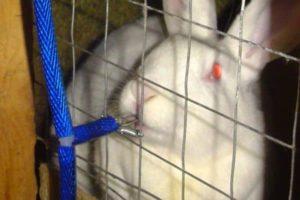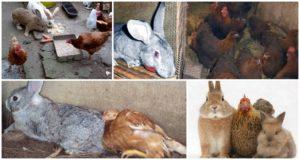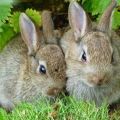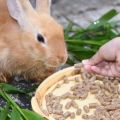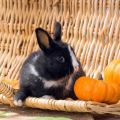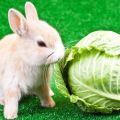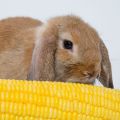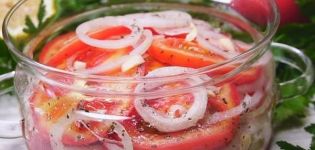The benefits and harms of corn for rabbits, how to feed it and in what form
Using corn to feed rabbits produces excellent results. This product contains many vitamins and microelements that saturate the body of animals with valuable substances and contribute to their full development. At the same time, it is necessary to introduce cereal into the diet of animals very carefully. Violation of the basic recommendations of specialists will lead to negative health consequences.
Can rabbits be fed corn?
The beneficial properties of corn are due to its composition. The grains of this plant contain the following components:
- vitamin E;
- B vitamins;
- vitamin C;
- retinol;
- vitamin PP.
Corn contains many minerals. These include potassium, copper, chlorine. Also the product includes sulfur and selenium. The nutritional value of 100 grams of corn kernels is 337 kilocalories. When the product is introduced into the diet of rabbits, it is possible to provide the animals with energy. This contributes to an increase in body weight. The culture is often used for fattening animals before slaughter. At the same time, different plant fragments are suitable for feeding the animals.
Leaves and stems
Corn leaves are often used to make silage. However, it is important to use young foliage. It contains the maximum juice and is very beneficial for rabbits.
You can give corn leaves fresh to the animals, slightly withering them in the shade. To prepare a product for the winter, it needs to be dried for several days. It is recommended to do this in the shade.
Shoots can be given to animals from 2.5-3 months. However, they need to be cut into pieces to make it easier for the rabbits to eat. Only young stems are suitable for feeding animals. It is important to remember about a sense of proportion. An excess of stems provokes dysfunction of the digestive system. For adult pets, you can feed 60-80 grams of chopped corn stalks. It is recommended to mix them with vegetables.
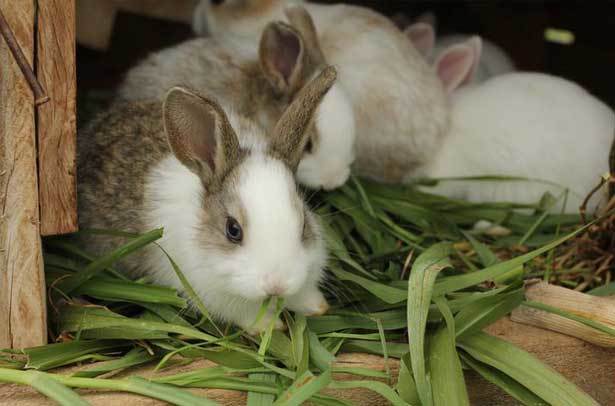
Cobs
It is permissible to give young ears to the animals directly from the beds. This must be done fresh. Moreover, the cobs do not have to be cleaned of leaves. Thanks to the use of such feed, it will be possible to improve weight gain in the autumn season - before slaughtering animals for meat.
The cobs can also be pre-processed. To do this, it is recommended to clean them of foliage, wash under running water and dry thoroughly. Then the cobs should be given to the rabbits as a whole or cut into several parts. Leaves are also recommended to be washed, dried and given separately from the grains. Purchased ears should be washed well and scalded with boiling water to get rid of pathogenic bacteria.
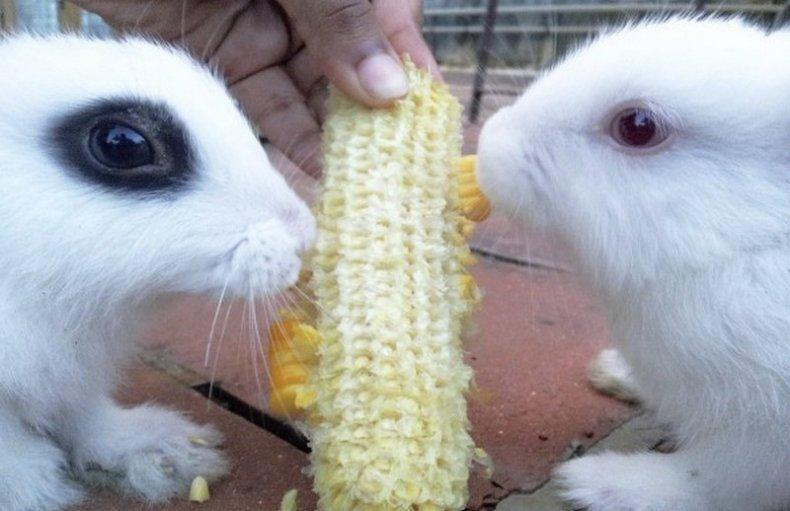
Corn
It is recommended to soak dry corn for 2-4 hours before feeding the animals. It should be borne in mind that this product does not contain too much protein. Therefore, it is recommended to combine it with other legumes.
How and how much to give?
Feeding animals with corn has a number of features. This cereal is allowed to be given to animals from an early age. However, this should take into account the developmental stages of animals.
Youngsters
In the first 1.5-2 months, the rabbits eat only breast milk. Moreover, from the 7th week of life, additional foods are allowed to be introduced into their diet. Corn must be dosed strictly. It is recommended to give the product in small quantities. This can be done a maximum of 1-2 times a week.
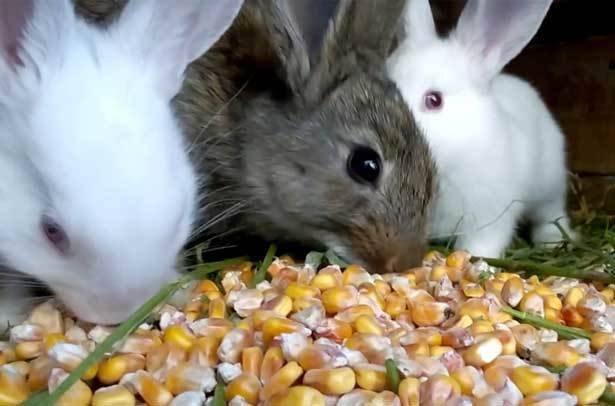
It is recommended to introduce corn cobs gradually. Experienced farmers advise to postpone this type of complementary feeding for up to 4 months.
Adults
Feeding adults is of particular importance at the stage of preparing animals for slaughter. To achieve a quick set of live weight, 1.5-2 months before slaughtering rabbits, they need to be given 60-150 grams of grains. At the same time, it is recommended to gradually increase the amount of this product.
At other times, the amount of corn in the diet of animals should not exceed 10-15%. This helps prevent the development of obesity and other diseases.
Felted bunnies
From the 4th week of gestation, it is recommended to feed the female rabbit with a large amount of corn. At this time, the internal organs of the fetus are formed, and its intensive growth begins. Thanks to the high nutritional value of the product, it is possible to accelerate the formation of embryos and to achieve the birth of large rabbits.
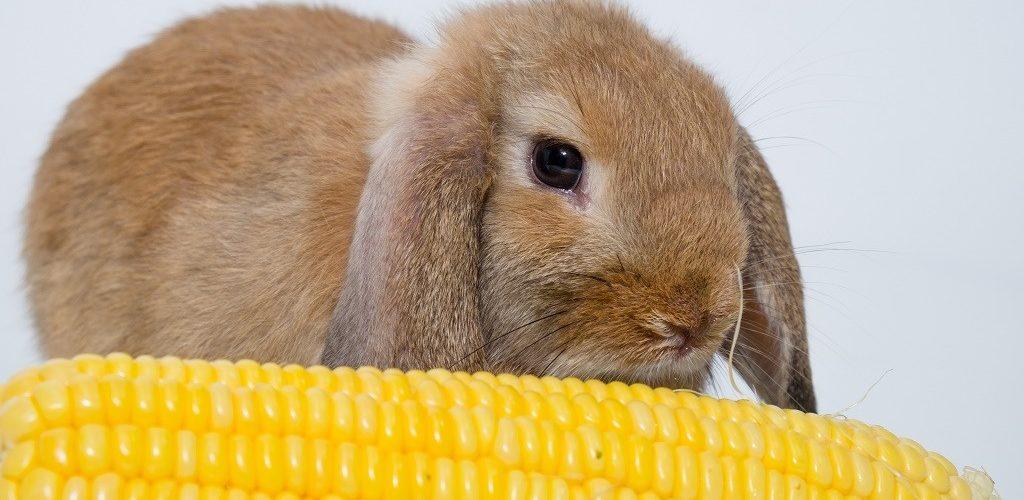
Moreover, during the mating period, corn must be completely removed from the diet of animals. Such food makes the animals lethargic and lazy. This negatively affects the reproductive functions of rabbits. After okrol, it is permissible to keep the grain in the rabbit's diet for some time. This helps to improve the nutritional profile of milk. However, from the 8th day after birth, the amount of this product is gradually reduced. This is done to prevent female obesity.
When corn is bad
It is forbidden to use corn as the main feed for rabbits, otherwise it can cause serious harm to animals. The main disadvantages of the product include the following:
- High calorie content. An excess of cereal in the diet of rabbits provokes the development of obesity. This is due to the high sugar, fat and starch content.
- Insufficient amount of calcium in the plant. Therefore, it must be combined with other cereals.
- Lack of protein components in cereals. To provide rabbits with protein, corn must be combined with other foods.
- The risk of developing allergies and digestive disorders. These side effects are most often provoked by the grain in young animals. This problem occurs especially often when a large amount of a product is introduced into the diet.
Corn is considered a very healthy food, which is definitely recommended to give to rabbits. In this case, the cereal must be introduced gradually and the reaction of the animals must be controlled. Thanks to this, it is possible to achieve maximum benefits and avoid negative consequences for the health of the animals.
